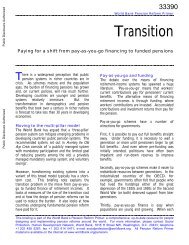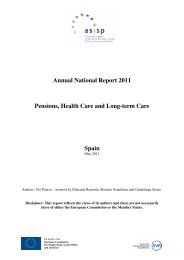Financial Sector Development in Africa: Opportunities ... - World Bank
Financial Sector Development in Africa: Opportunities ... - World Bank
Financial Sector Development in Africa: Opportunities ... - World Bank
Create successful ePaper yourself
Turn your PDF publications into a flip-book with our unique Google optimized e-Paper software.
The Potential of Pro-Market Activism for F<strong>in</strong>ance <strong>in</strong> <strong>Africa</strong>: A Political Economy Perspective 215<br />
practitioners to support well-designed, time-bound activist policies to<br />
complement modernist approaches.<br />
But what if the political economy analysis suggests that the preconditions<br />
are not <strong>in</strong> place and governments are not likely to pursue activist<br />
policies successfully? The political economy framework drawn up <strong>in</strong> the<br />
last section emphasizes that policy choices are, at least to some extent,<br />
outcomes of the historical development path of a country. These historical<br />
foundations do not lend themselves to simple policy proposals<br />
because they suggest that there is some element of path-dependency <strong>in</strong><br />
policy mak<strong>in</strong>g. However, by tak<strong>in</strong>g the political economy framework as a<br />
start<strong>in</strong>g po<strong>in</strong>t, it is possible to propose strategies for economic change <strong>in</strong><br />
the short and longer terms, and also to draw policy implications for those<br />
<strong>Africa</strong>n countries with a political environment unfavorable to activism.<br />
The political economy perspective suggests that policy makers and advisors<br />
<strong>in</strong> these countries seek<strong>in</strong>g to promote access to f<strong>in</strong>ance need to pursue<br />
alternative strategies. In countries where activism is unlikely to work<br />
effectively, there are two ma<strong>in</strong> strategies to align the <strong>in</strong>terests and <strong>in</strong>centives<br />
of the political and economic elites with those of the wider society.<br />
The first is to change the power balance <strong>in</strong> society to expand the space<br />
for reform policies; the second is to work with<strong>in</strong> this power balance.<br />
Chang<strong>in</strong>g the power relationships with<strong>in</strong> society. If the political economy<br />
analysis suggests that the political environment is not favorable to effective<br />
activist policy mak<strong>in</strong>g, then one of the two ma<strong>in</strong> options is to implement<br />
policies that focus on chang<strong>in</strong>g the balance of power <strong>in</strong> society <strong>in</strong> a<br />
direction that is more favorable to <strong>in</strong>clusive f<strong>in</strong>ancial systems. Such a<br />
strategy is clearly a complex, mid- to long-term, politically sensitive task.<br />
However, some donors, <strong>in</strong> concert with reform-oriented domestic constituencies<br />
and <strong>in</strong> some cases the diaspora, are already implement<strong>in</strong>g<br />
strategies for strengthen<strong>in</strong>g the political power of those groups with an<br />
<strong>in</strong>terest <strong>in</strong> a greater and more susta<strong>in</strong>able outreach of f<strong>in</strong>ancial services.<br />
There is a large body of work (Przeworski 2000; Wittman 1989) that<br />
argues that one potential way to change the power balance with<strong>in</strong> society<br />
is to change the political <strong>in</strong>stitutions and to try to <strong>in</strong>duce greater political<br />
competition because this would stimulate more socially efficient policies.<br />
This argument is <strong>in</strong> l<strong>in</strong>e with the political <strong>in</strong>stitutions view of f<strong>in</strong>ancial<br />
sector development, which expla<strong>in</strong>s the cross-country variation <strong>in</strong> f<strong>in</strong>ancial<br />
development by variation <strong>in</strong> the degree of access to political <strong>in</strong>stitutions<br />
(Haber, North, and We<strong>in</strong>gast 2008). However, as outl<strong>in</strong>ed <strong>in</strong><br />
previous sections, democracy has been a poor predictor for successful







